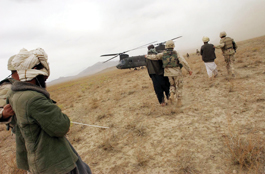home | metro silicon valley index | movies | current reviews | film review

CAPTIVE: Afghan detainees face an uncertain future in 'Taxi to the Dark Side.'
Naked
Alex Gibney's documentary 'Taxi to the Dark Side' shows us the road to Abu Ghraib
By Richard von Busack
CONSIDERING the trials and the hearings, much of what went on in Bagram in Afghanistan, in Abu Ghraib in Iraq and at Guantanamo Bay in Cuba remains a mystery to the general public. Some may dismiss it as the deeds of the proverbial few bad apples, but Taxi to the Dark Side makes a case that those bad apples didn't fall far from a very bad tree. Documentary filmmaker Alex Gibney (Enron: The Smartest Guys in the Room) traces the greatest blunder of the Bush administration right to where it originated. George W. Bush's career-long interest in punishment, Donald Rumsfeld's arrogance and Dick Cheney's cold sadism made them inclined to covertly approve the mistreatment of prisoners. The legal defense by attorneys Alberto Gonzales and John Yoo gave the executives plausible deniability. Ridiculously hypothetical "ticking bomb" scenarios, as enacted on TV's 24, were used as guidelines for policy. And Bush and Cheney have already pardoned themselves in advance against the possibility of war-crimes trials.
Taxi to the Dark Side digests news that Tim Golden and Carlotta Gall reported in The New York Times. It's a different matter to see it than to read it. The film loops around the tragedy of one Dilwar, a "person under control" tortured and kicked to death by our troops in Bagram. This enemy of our state turned out to be a 122-pound taxi driver, framed for money by one of our Afghan allies. Gibney demonstrates how the methods of psychological torture and humiliation migrated from prison camp to prison camp. Uncensored news photos demonstrate the stress positions, terrorizing and constant sexual humiliation inflicted by MPs.
Having access to a 65-page report of Mohammed al Qahtani's surreal, even Monty Python–style mistreatment at Guantanamo, Gibney restages it in docudrama—a Saw-style stutter of digitized images. (Interesting that the MPAA approved the severed-head posters for Saw IV but balked when this film tried to advertise itself with a hooded prisoner on its poster.) The fruits of just such mayhem were the lies and misinformation a dutiful Colin Powell hauled to the U.N. While Taxi to the Dark Side is tragic, harrowing viewing, there is some skull-faced humor during a Guantanamo Bay junket. Naturally, the tour finishes at the gift shop, where one can buy a souvenir T-shirt reading "Behavior Modification Instructor, Guantanamo Bay."
During the end titles, Gibney reveals personal knowledge of how the military can retrieve info and still keep its gloves on. The director includes a modest, two-minute demonstration of the correct method of information gathering by former FBI agent Jack Cloonan—a open-faced party on the lines of Sam Elliott. He was persuasive. (After a few minutes with him, I would have given him power of attorney.) Interviewee Alfred McCoy, author of A Question of Torture, has perhaps the biggest picture; he claims what went on in our anti-terrorist gulag represents "a 50-year history of CIA methods." So this national shame may not be rooted in military discipline or a lack of the same. Rather, it's rooted in the intelligence cult, a cultural class that believes in betraying American values in the name of American strength—and believes that causing suffering in others is how we prove ourselves tough.
![]() TAXI TO THE DARK SIDE (R; 106 min.), a documentary by Alex Gibney, opens Feb. 8 at the newly reopened Camera 3 in San Jose.
TAXI TO THE DARK SIDE (R; 106 min.), a documentary by Alex Gibney, opens Feb. 8 at the newly reopened Camera 3 in San Jose.
Send a letter to the editor about this story.
|
|
|
|
|
|